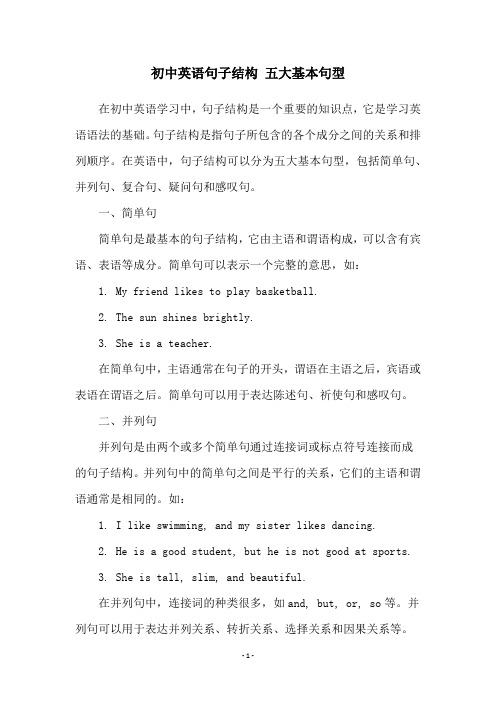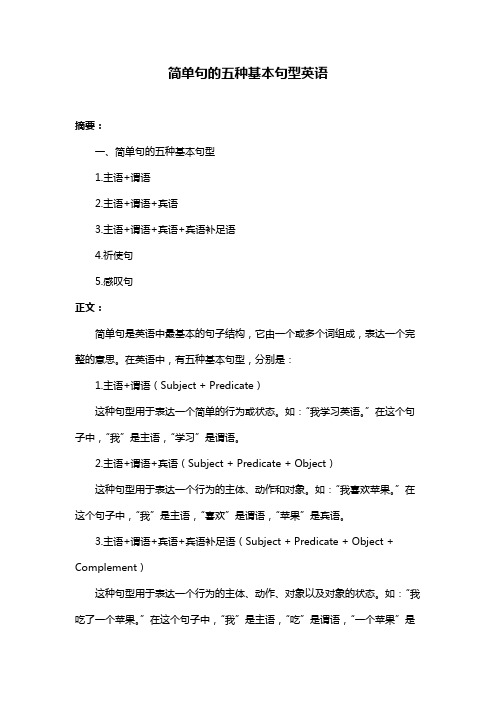初中英语知识点总结:简单句及简单句的五种基本句型
- 格式:doc
- 大小:19.05 KB
- 文档页数:2

英语简单句的五种基本句型第一篇:英语简单句的五种基本句型英语简单句的五种基本句型1、S+V+(状语)主谓(不及物动词)2、S+V+O主谓宾3、S+V+C /SVP主系表4、S+V+O+O主谓+双宾语5、S+V+O+C主谓+复合宾语S+V+PS+V+OS+V+IO +DOS+V +O +OC第二篇:英语简单句五种基本句型详解基本句型英语句子成分的排列顺序与汉语不同。
汉语放在前面的,英语可能要放在后面;而汉语放后面的,英语可能放在前面。
即使是同样一句话,如果用词不同,句中的次序也会有变化。
比如,“我每天骑自行车上学”,可以表达为 I go to school by bike every day.也可以表达为I ride to school every day.如果用图表分析一下,我们会看得更清楚:这三个语句除了行为者“I”的位置没有变化外,其它都发生了变化,并且由于“上学”表达方式的不同,在句中的位置也发生了变化。
句子成分详解一览表及巧记口诀句子成分学记口诀主语谓语是基础,宾表定状补辅助。
宾主来自名代数,动词作谓不可无。
简单句的五种基本句型英语是一种结构型的语言,以谓语动词为核心构成各种句型。
为了帮助你掌握英语的句型,本节课我们一起来总结一下英语的基本句型。
4.主语 + 及物动词 + 间接宾语 + 直接宾语(+ 状语)5.主语 + 及物动词 + 宾语 + 宾语补足语(+ 状语)第三篇:简单句基本句型英语句子的类型一.简单句的基本句型及造句1.主语+系动词+表语。
2.主语+不及物动词(主谓)。
3.主语+及物动词+宾语。
4.主语+及物动词+间宾+直宾。
5.主语+及物动词+宾语+宾补。
例句:I am happy.He is a student.She looks tired.I work.He is standing.You are sitting.I study English.I cook dinner.He is having lunch.He teaches us English.We call him Da Mao.He bought me a card.We should keep our classroom clean.He asks me to study hard.He helps me carry water.第四篇:简单句的五种基本句型及句型成分练习简单句的五种基本句型1.S十V主谓结构2.S十V十P主系表结构3.S十V十O主谓宾结构4.S十V十O1十O2 主谓双宾结构5.S十V十O十C 主谓宾补结构判断类型和句子成分:She came.She likes English.She is happy.The teacher asked me to read the passage.She bought a book for me.She gave John a book.My head aches.She makes her mother angry.The sun was shining.The moon rose.The dinner smells good.Everything looks different.He is growing tall and strong.His face turned red.Who knows the answer?He enjoys reading.I want to have a cup of tea.。

【用法讲解】考试要求:简单句的五种基本句型及There be句型是英语学习的基础和重点,也是中考试卷的重点,在书面表达、句子改写和翻译句子中都经常考查有关句子的知识;感叹句、疑问句、祈使句更是单项选择和句型转换的重点。
1.简单句的句型简单句就是句子只有一个主语和谓语,有五种基本句型:(1)主语+谓语:这种句型称为主谓结构(S+V),其谓语一般是不及物动词。
例如:The rain stopped. 雨停了。
Things have changed now. 现在事情发生了变化。
(2)主语+连系动词+表语:这种句型称为主系表结构(S+L+P),连系动词在形式上也是一种谓语动词,表语一般是名词或者形容词。
例如:His father is a teacher. 他的爸爸是老师。
(表语是名词)Your mother is very young. 你的妈妈很年轻。
(表语是形容词)(3)主语+谓语+宾语:这种句型称为主谓宾结构(S+V+O),其谓语动词是及物动词,宾语一般是直接宾语。
例如:They often speak English at the meeting. 他们在会上经常说英语。
The house caught fire. 房子着火了。
(4)主语+谓语+间接宾语+直接宾语:这种句型称为主谓宾宾结构(S+V+O+O),其谓语动词必须是可以跟双宾语的动词,两个宾语中表示事物的是直接宾语,另一个表示人的是间接宾语。
例如:My father gave me a pen last night. 昨天晚上我爸爸给我一支钢笔。
I will write you a letter when I get there. 我到那里儿时给你写信。
(5) 主语+谓语+宾语+宾语补足语:这种句型称为主谓宾及宾补结构(S+V+O+C)其谓语动词必须是可以跟复合宾语的及物动词。
例如:I find him very clever. 我发现他很聪明。

初中英语语法专题讲解1——简单句的五种基本句型英语中千变万化的句子归根结底都是由以下五种基本句型组合、扩展、变化而来的:1)主+ 动(SV)例如:I work.我工作。
2)主+ 动+ 表(SVP)例如:John is busy.约翰忙。
3)主+ 动+ 宾(SVO)例如:She studies English.她学英语。
4)主+ 动+ 宾+ 补(SVOC)例如:Time would prove me right. 时间会证明我是对的。
5)主+ 动+ 间宾+ 直宾(SVOiOd)例如:My mother made me a new dress.我母亲给我做了一件新衣裳。
英语中的各种句子分为简单句和复合句,其中简单句中包含有五种基本句型。
1.S+Vi(Subject主语+Intransitive Verb不及物动词)例:The sun rises in the east.太阳从东方升起。
She is walking along the lake.她正沿着湖边走。
2.S+Vt+O(Subject主语+Transitive Verb及物动词+Object 宾语)例:He found a bird in the tree.他发现树上有一只鸟。
I like this book very much.我非常喜欢这本书。
3.S+link.V+P(Subject主语+link.verb系动词+Predicative 表语)1)句型中系动词的位置可以用be动词来代替。
2)句型中系动词可分为:表状态的系动词:be,keep,lie,look,remain,seem,smell,sound,sit,stand,stay,taste等。
表变化或结果的系动词:become,come,get,grow,go,fall,prove,turn等。
例:Time is up.时间到了。
That man seems kind.那人看起来很善良。

初中英语句子结构五大基本句型在初中英语学习中,句子结构是一个重要的知识点,它是学习英语语法的基础。
句子结构是指句子所包含的各个成分之间的关系和排列顺序。
在英语中,句子结构可以分为五大基本句型,包括简单句、并列句、复合句、疑问句和感叹句。
一、简单句简单句是最基本的句子结构,它由主语和谓语构成,可以含有宾语、表语等成分。
简单句可以表示一个完整的意思,如:1. My friend likes to play basketball.2. The sun shines brightly.3. She is a teacher.在简单句中,主语通常在句子的开头,谓语在主语之后,宾语或表语在谓语之后。
简单句可以用于表达陈述句、祈使句和感叹句。
二、并列句并列句是由两个或多个简单句通过连接词或标点符号连接而成的句子结构。
并列句中的简单句之间是平行的关系,它们的主语和谓语通常是相同的。
如:1. I like swimming, and my sister likes dancing.2. He is a good student, but he is not good at sports.3. She is tall, slim, and beautiful.在并列句中,连接词的种类很多,如and, but, or, so等。
并列句可以用于表达并列关系、转折关系、选择关系和因果关系等。
三、复合句复合句是由一个主句和一个或多个从句组成的句子结构。
从句可以作为主句的主语、宾语、表语或定语。
如:1. I know that you are busy.2. She likes the book which I bought yesterday.3. He is the boy who won the first prize.在复合句中,从句通常由连接词引导,如that, which, who, when, where, why等。

简单句的五种基本句型英语
摘要:
一、简单句的五种基本句型
1.主语+谓语
2.主语+谓语+宾语
3.主语+谓语+宾语+宾语补足语
4.祈使句
5.感叹句
正文:
简单句是英语中最基本的句子结构,它由一个或多个词组成,表达一个完整的意思。
在英语中,有五种基本句型,分别是:
1.主语+谓语(Subject + Predicate)
这种句型用于表达一个简单的行为或状态。
如:“我学习英语。
”在这个句子中,“我”是主语,“学习”是谓语。
2.主语+谓语+宾语(Subject + Predicate + Object)
这种句型用于表达一个行为的主体、动作和对象。
如:“我喜欢苹果。
”在这个句子中,“我”是主语,“喜欢”是谓语,“苹果”是宾语。
3.主语+谓语+宾语+宾语补足语(Subject + Predicate + Object + Complement)
这种句型用于表达一个行为的主体、动作、对象以及对象的状态。
如:“我吃了一个苹果。
”在这个句子中,“我”是主语,“吃”是谓语,“一个苹果”是
宾语,“了”是宾语补足语。
4.祈使句(Imperative Sentence)
祈使句用于表达命令、请求、劝告等。
如:“请打开窗户。
”在这个句子中,没有主语,只有谓语“打开”。
5.感叹句(Exclamatory Sentence)
感叹句用于表达惊喜、惊讶、赞叹等强烈情感。
如:“多么美丽的景色!”在这个句子中,“多么”是感叹词,“美丽”的“景色”是主语和宾语。
以上就是英语简单句的五种基本句型。

这五种简单句基本句型,是学好初中英语的关键!简单句的基本句型【知识梳理】英语句子成千上万,其变化也不计其数。
然而,这其中只有五种基本句型。
学会准确运用英语简单句的五大基本句型,是学好英语的基本功之一。
一、SV句型,即“主语+谓语”本句型中的谓语动词是不及物动词。
所谓不及物动词,就是他们之后不需要接宾语,就可表达一个完整的意思的一类动词。
这些动词常见的有:work, come, die, run, fly, wait, sit等等。
如:All the students in Class 1 work hard. 所有一班的学生学习认真。
【友情提醒】有些SV句型的句子,当其谓语动词表示运动或呆在某处时,一般要接一个表示方向或地点的状语,以使句子的表达更清楚、更完整。
但值得注意的是,这并不能影响句子的基本结构。
如:Please wait outside the school gate. 请在学校大门外等。
二、SVP句型,即“主语+谓语+表语”这种基本句型表示主语的状态及特征等,其中谓语动词为连系动词,表语多为形容词、名词、代词、副词或相当于名词或形容词的词和短语,表语和连系动词一起构成系表结构。
在初中阶段,我们经常碰到的连系动词一般可以分为两类:①表状态:be, look, seem, taste, smell等;如:The fish on the plate smells bad. 盘子里的鱼闻起来臭了。
②表转变或结果:become, get, turn, grow等。
如:Leaves on the trees turn yellow in Autumn.秋天树叶变黄。
三、SVO句型,即“主语+谓语+宾语”此种基本句型的谓语动词为“单宾及物动词”。
所谓及物动词,是指他们后边需要接上宾语,才能表达一个完整意思的一类动词。
宾语通常为名词、代词、动名词、动词不定式等,它同及物动词一起说明主语做什么。
如:I remember to return your book on time. 我记住按时归还你的书。
初中英语简单句的基本句型一.句子的种类(一)根据结构划分:①简单句:(5种基本句型)主+谓主+谓+宾主+系+表主+谓+双宾(间宾+直宾)主+谓+宾+宾补②并列句and, but,or③复合句:名词从句(宾,主,表,同)副词从句(状语从句)形容词从句(定语从句)(二)根据功能划分:陈述句,祈使句, 感叹句,疑问句(一般疑问句,特殊疑问句,选择疑问句,反意疑问句等)五种基本句型【句型一】主语+ 谓语(不及物动词vi.)主语:可以作主语的成分有名词,主格代词,动词不定式,动名词等等。
主语一般在句首。
谓语:谓语由动词构成,是英语时态、语态变化的主角,一般在主语之后。
不及物动词(vi.)没有宾语。
His father cooks。
The children are listening quietly。
He runs fast in the street。
The meeting begins at nine.They worked day and night。
I lived in Beijing five years ago.【句型二】主语+ 谓语(及物动词vt。
)+ 宾语及物动词后必须跟有一个宾语,即动作的承受者He didn’t like the film.She often helps him。
I have already finished reading the book。
They decided to go hiking.He thought about the problem for a few moments。
Who knows the answer?【句型三】主+ 系+ 表(什么是什么)连系动词主要是起到连系主语和表语的作用.系动词可分四类:1. 表“是" 如be “是”(am, is, are,was, were)2。
感官动词如:look看起来feel感觉起来,sound听起来,smell闻起来,taste 尝起来3。
英语中简单句的五种句型
英语中简单句的五种句型分别是:主语+谓语、主语+谓语+宾语、主语+谓语+表语、主语+谓语+宾语+宾补和主语+谓语+宾语+状语。
以下是这五种句型的详细介绍:
1.主语+谓语:这种句型中的谓语动词是不及物动词,即动词后面不需
要宾语,直接表达动作或状态。
例如:“He smiled. 他笑了。
”2.主语+谓语+宾语:这种句型中的谓语动词是及物动词,即动词后面需
要宾语来表达动作或状态。
例如:“He likes music. 他喜欢音乐。
”
3.主语+谓语+表语:这种句型中的谓语动词是系动词,如“be”、
“seem”、“look”等,后面连接的是表语,通常描述主语的性质或状态。
例如:“He is a teacher. 他是一名老师。
”
4.主语+谓语+宾语+宾补:这种句型中的谓语动词后需要一个宾语和一
个宾补来共同表达完整的动作或状态。
例如:“They elected him president. 他们选举他为总统。
”其中,“president”是宾补,补充说明“他”的身份。
5.主语+谓语+宾语+状语:这种句型中的谓语动词后需要一个宾语和一
个状语来共同表达完整的动作或状态。
例如:“She sings
beautifully. 她唱得很美。
”其中,“beautifully”是状语,修饰“唱”这个动作。
以上就是英语中简单句的五种句型。
初中英语-五种基本句型
一、五种简单句基本句型
1.“主语+谓语”(即“主谓”句型)
这一句型英汉语言结构形式完全相同,说明“某人或某物如何动作”,或者说“某人或某物自身怎样运动”。
例:They arrived in Harbin yesterday morning.
分析:“they”(主语)“arrived”(谓语)。
2.“主语+谓语+宾语”(即“主谓宾”句型)
这一句型英汉语言的结构形式完全相同,用以说明“某人或某物做什么事情”,或者说“某人或某物发出了动作,并且其动作涉及到另一个人或物”。
例:I study English.
分析:“I”(主语)“study”(谓语动作)“English”(宾语即动作涉及的对象)。
3.“主语+谓语+间接宾语+直接宾语”(即“主谓双宾”句型)这一句型英汉语序结构相同,说明“某人为谁(间接宾语为人)做某事”,或者说“某人或物的运动涉及到两个对象,其中一个间接对象为人,另一个为物”。
例:Our teacher taught us English.
分析:“our teacher”(主语)“教”(谓语动作)“us”(间接宾语)“English”(直接宾语)。
4.“主语+谓语+宾语+宾语补足语”(即“主谓宾宾补”句型)这一句型说明“某人或某物要求(使、让)某人做什么”或“某人感觉某人或物怎么样”。
初中英语五大基本句型初中英语共有五大基本句型,它们是简单句、并列句、复合句、选择疑问句和特殊疑问句。
下面将详细介绍这五种句型及其用法。
1. 简单句(Simple Sentence)简单句由一个主语和一个谓语构成,表达一个完整的叙述意思。
句子中可以有其他成分如宾语和状语等。
例如:- I like cats.(我喜欢猫。
)- She is reading a book.(她在读一本书。
)- We played football yesterday.(我们昨天踢足球。
)2. 并列句(Compound Sentence)并列句由两个或多个简单句通过连词连接而成。
这些简单句相互独立,不依赖于其他句子。
一般使用连词and, but, or等。
例如:- I like to swim, and my brother likes to play basketball.(我喜欢游泳,我弟弟喜欢打篮球。
)- She is studying for her test, but I'm watching TV.(她在为她的考试学习,但是我在看电视。
)- You can choose to go to the beach or stay at home.(你可以选择去海滩还是待在家里。
)3. 复合句(Complex Sentence)复合句由一个主句和一个或多个从句构成。
主句是完整的句子,而从句是一个依附于主句的不完整的句子。
从句可以是名词从句、定语从句或状语从句。
例如:- I know that she is coming to visit us tomorrow.(我知道她明天要来看我们。
)- The book that I borrowed from the library is very interesting.(我从图书馆借的那本书很有趣。
)- We will go to the park if it doesn't rain tomorrow.(如果明天不下雨,我们会去公园。
初中英语知识点总结:简单句及简单句的五种基本句型
1、SVC结构(主语+系动词+表语)
在这种句型中,动词必须是系动词,在动词之后跟有表语。
表语可以是名词(词组),形容词(词组),副词(词组)等。
如:
The teacher is kind. She looks fine.
My son became a doctor at last.
系动词除be外,常见的还有keep, look, feel, smell, sound, taste, grow, get, go, turn
2、SV结构(主语+不及物动词)
(1) 在这个结构中,动词是不及物动词,动词后边没有宾语,如:
My head aches. He is singing.
(2) 有些动词后边必须带有状语,否则意思就不明确。
如:
The professor lives in Beijing.
We stayed in China for a few days.
常见的不及物动词有:sleep, walk, swim, happen, take place, go, come, work, laugh, stay.
3、SVO结构(主语+及物动词+宾语)
在这个结构中,谓语动词必须是及物动词,在动词后边跟有宾语。
He can drive a car. They speak English.
有些不及物动词后面加上介词或副词可以把它看成一个及物动词,这时后边可接宾语。
Please listen to me carefully.
4、SVOO结构(主语+动词+间接宾语+直接宾语)
(1) 双宾语结构在这个结构中,动词是带有双宾语(直接宾语和间接宾语)的及物动词。
直接宾语多指物,间接宾语多指人。
常用的带有双宾语的动词有:give, send, tell, bring, lend, buy, teach, get, call, do, ask, wish, offer等。
He gave the inspector his passport.
My father taught us English.
(2) 宾语的位置
间接宾语一般放在直接宾语之前,但是,如果为了强调间接宾语或者由于间接宾语较长,常把间接宾语放在直接宾语之后,这时要在间接宾语的前面加上适当的介词。
如:The old man bought his daughter a nice scarf.
The old man bought a nice scarf for his daughter.
Give the teacher this book.=Give this book to the teacher.
5、SVOC结构(主语+动词+宾语+宾语补足语)
在这种结构中,宾语补足语是用来补充说明宾语的。
(1) 在某些及物动词后,需要一个宾语再加上一个宾语补足语才能表达完整的意思,这样的宾语和宾补称为复合宾语。
名词、形容词、不定式、分词、副词都可以作宾补。
(2) 常跟复合宾语的动词有:call, name, make, think, find, leave, keep等。
如:
His mother finds him a clever boy.
Please keep the room clean.
(3) 在see, watch, look at, listen to, hear, feel, let, make(使), have(使)等这些词后的宾补,如果是不定式担当的,则省去“to”,但变为被动语态时“to”要还原。
如:
I heard a man knock at the door three times.
A man was heard to knock at the door three times.。